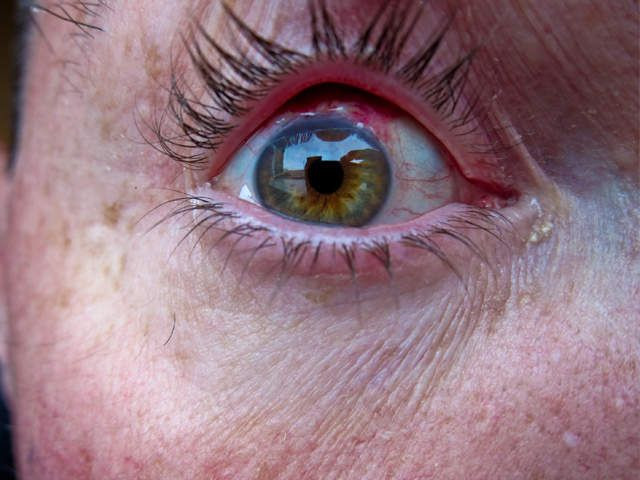Contact Lens Wearers Beware: 5 Things That Can Go Horribly Wrong Without The Proper Care

Although necessary for some people, contact lenses can lead to serious health concerns if they are not properly cared for. The Food and Drug Administration advises contact lens wearers to be extremely vigilant when it comes to cleaning and disinfecting contact lenses as well as their storage cases and solution. People who don’t adhere to hygienic contact lens recommendations run the risk of developing eye irritation or infection in the form of discomfort, excessive tearing, light sensitivity, itching, blurred vision, swelling, and pain. Aside from these relatively common eye infection symptoms, improper contact lens care can lead to a string of more serious complications with nightmarish results.
1. Going Blind Due To Poor Contact Use
While going blind from wearing contact lenses is a rare occurrence, it is still a possibility. In fact, the Centers for Disease Control and Prevention estimates that blindness caused by a severe eye infection can affect up to one out of every 500 contact lens users each year. To lower their risk of developing a serious complication related to contact lens use, wearers should refrain from sleeping with their contacts, wearing them for too long, sharing their contacts with friends, or washing lenses with anything but contact lens solution. These simple recommendations seem to be a problem for most contact lens users, seeing as between 40 to 90 percent do not properly follow contact lens care instructions.
2. Contact Lens Parasites
Parasites on an eye ball may seem like a scenario straight out of a scary movie, but for a 23-year-old Taiwanese student, Lian Kao, it became all too real. After wearing her contacts for six months, the singled-celled amoeba, acanthamoeba, settled in the area between her eye and contact lens before feeding on her cornea. Due to wearing her contact lenses for far too long, Kao developed a fairly rare condition known as Acanthamoeba keratitis which caused her to lose an eye.
“Contact lens wearers are a high-risk group that can easily be exposed to eye diseases,” said director of ophthalmology at Taipei's Wan Fang Hospital, Wu Jian-Liang. “A shortage of oxygen can destroy the surface of the epithelial tissue, creating tiny wounds into which the bacteria can easily infect, spreading to the rest of the eye and providing a perfect breeding ground. The girl should have thrown the contact lenses away after a month, but instead, she overused them and has now permanently damaged her corneas.”
3. Swimming With Contact Lenses In
You never know what kind of bacteria could be hiding in swimming pools, hot tubs, lakes, and the ocean so wearers are advised to remove their lenses before taking a dip. Back in 2012, 28-year-old Jennie Hurst lost the vision in her left eye after swimming with her contact lenses in. Unlike Kao, Hurst said she always practiced good contact lens hygiene, including taking them out before bed, washing her hands before handling her lenses, and replacing them each month. Despite her attention to detail when it came to contact lens care, Hurst developed Acanthamoeba keratitis after a few lapses in a hotel pool caused her to go blind in her left eye.
4. Eye Ulcers
In addition to blindness, common eye infections can lead to other serious health complications, including corneal ulcers. The cornea is a clear layer of tissue at the front of the eye that is described as the window of the eye and permits light to enter. Small injuries to the eye, wearing contact lenses for too long, or wearing them while asleep can lead to an infection that causes an open sore on the cornea. Corneal ulcers can develop from various common eye infections, including Acanthamoeba keratitis, herpes simplex keratitis, and fungal keratitis. Patients with severe corneal ulcers sometimes require a corneal transplant where corneal tissue is replaced by healthy donor tissue.
5. Decorative Eye Lens Injuries
To help improve the quality of their Halloween costume, people will often turn to decorative contact lenses that make their eyes look like that of a cat, vampire, or zombie. Some of these people are so eager to up the realistic effect of their costume that they fail to visit an eye doctor for a prescription, which can lead to serious health issues. The FDA considers all contact lenses to be medical devices whether they’re used to correct the wearer’s vision or compliment their Halloween costume. Purchasing decorative lenses at a flea market, over the Internet, or through a beauty salon can leave the user at a disadvantage without an optometrist who can fit lenses properly and teach proper contact care.
"Even though these are non-corrective lenses, they still pose the same potential health and safety risks as other contact lenses," Dr. Glenda Secor, chair of the AOA's Contact Lens and Cornea Section, said in a statement. "Don't buy contacts from any store or website that doesn't require an eye doctor's prescription. In other words, if you can walk in off the street, or log-on to a website and buy them without verification of your prescription, the lenses are not being sold legally."



























